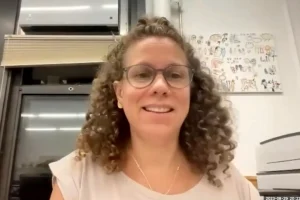Hello Kitty at 50: The mouthless face that launched an $80 billion empire

She weighs three apples and stands five apples tall. She enjoys baking cookies and dreams of being a pianist or poet. And now, despite her ageless appearance, she is 50 years old.
Friday marks half a century since Japanese merchandising company Sanrio created the first iteration of Kitty White, or Hello Kitty, a cheerful feline girl (not, as her creator controversially revealed in 2014, a cat) who lives with her family in London’s suburbs. In the decades since debuting, she has become a UNICEF ambassador, a special envoy for Japan’s Foreign Ministry and the subject of themed restaurants, cafes, two amusement parks and even a maternity hospital.
As such, Hello Kitty is also a commercial behemoth that has earned her creator an estimated $80 billion, placing her alongside Pokémon, Mickey Mouse and Winnie-the-Pooh as history’s top-grossing franchises. Unlike others on the list, however, merchandise wasn’t a profitable extension of Hello Kitty’s on-screen popularity — it was her raison d’être from the start.
Designed to adorn children’s items and stationery, she was first drawn by Yuko Shimizu, one of Sanrio’s in-house illustrators, in 1974. The company wanted designs embodying “kawaii,” a Japanese term for cuteness, and the 24-year-old’s cat-like creation was inspired by a kitten her father had given her as a gift. Hello Kitty made her commercial debut the next year, appearing on a line of vinyl coin purses alongside several other new characters.
She proved, by far, to be the company’s most popular new design. Sanrio’s sales soared almost immediately as her image was pasted onto toys, stickers and much else. But if the character’s early success can be attributed to Shimizu’s simple, memorable design — comprising a mouthless face, oval yellow nose, whiskers and a bow — her status as a pop culture icon is thanks to illustrator Yuko Yamaguchi.
Considered Hello Kitty’s third designer (Shimizu left Sanrio three years after inventing the character and was replaced by Setsuko Yonekubo, who briefly oversaw the design in the late 1970s) Yamaguchi has steered the character’s visual identity for almost 45 years. Speaking to CNN at Sanrio’s Tokyo headquarters, she recalled joining the company at a time when Hello Kitty products were declining in popularity.


